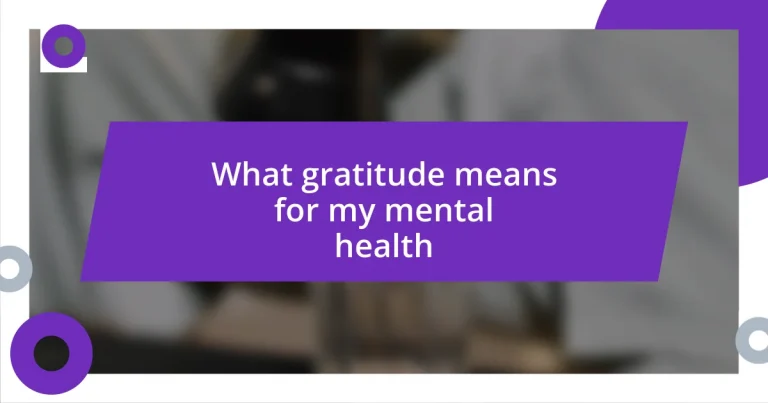Key takeaways:
- Practicing gratitude leads to improved mental health, reducing symptoms of depression and anxiety while enhancing overall well-being.
- Effective gratitude practices include gratitude journaling, sharing appreciation aloud, and gratitude meditation, each fostering deeper connections and positive emotions.
- Long-term engagement in gratitude acts as a mental shield, promoting resilience and positive shifts in mindset during challenging times.
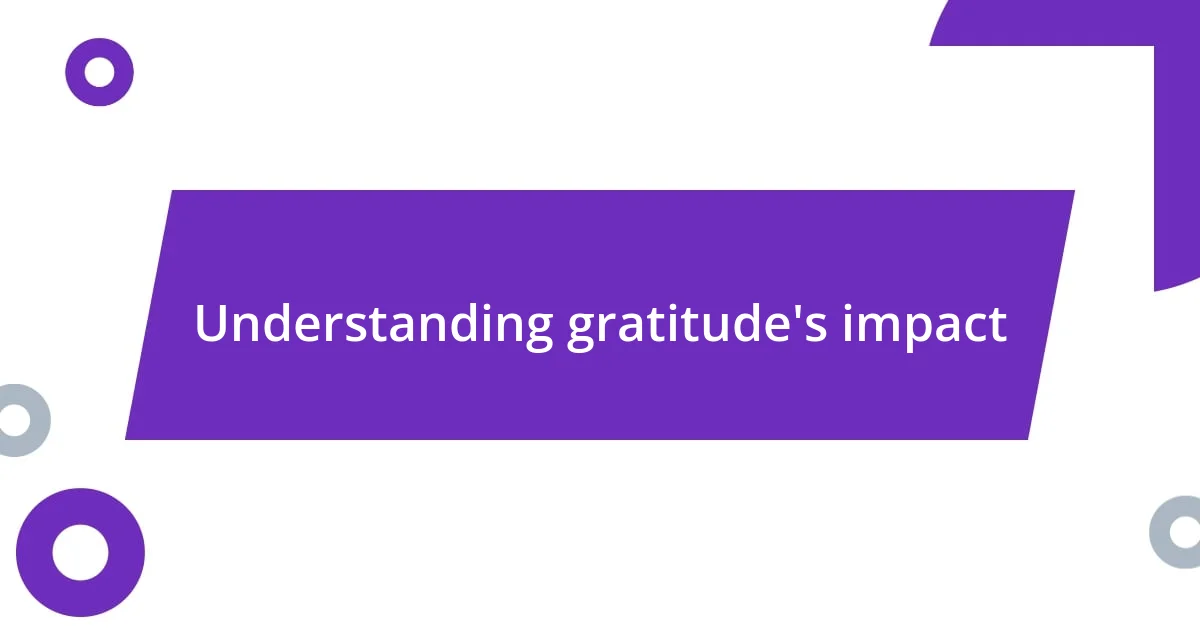
Understanding gratitude’s impact
Gratitude can be a powerful tool in shaping our mental health. I remember a time when I was overwhelmed by stress and negativity. I started jotting down three things I was grateful for each day, and surprisingly, the simple act of reflecting on my blessings influenced my mood significantly.
Studies show that practicing gratitude can lead to reduced symptoms of depression and anxiety. It’s fascinating how focusing on what we appreciate helps shift our mindset. Have you ever noticed how moments of thankfulness can make difficult times seem less daunting? That’s exactly what happened to me—it’s as though gratitude created a buffer against life’s challenges.
Moreover, gratitude fosters stronger connections with others. When I expressed my appreciation to a friend, it not only enhanced our bond, but it also lifted my spirits instantly. Isn’t it amazing how sharing gratitude can create a ripple effect, lifting not just our own spirits, but also those around us? The impact of gratitude reaches beyond ourselves; it cultivates a sense of belonging and support in our communities.
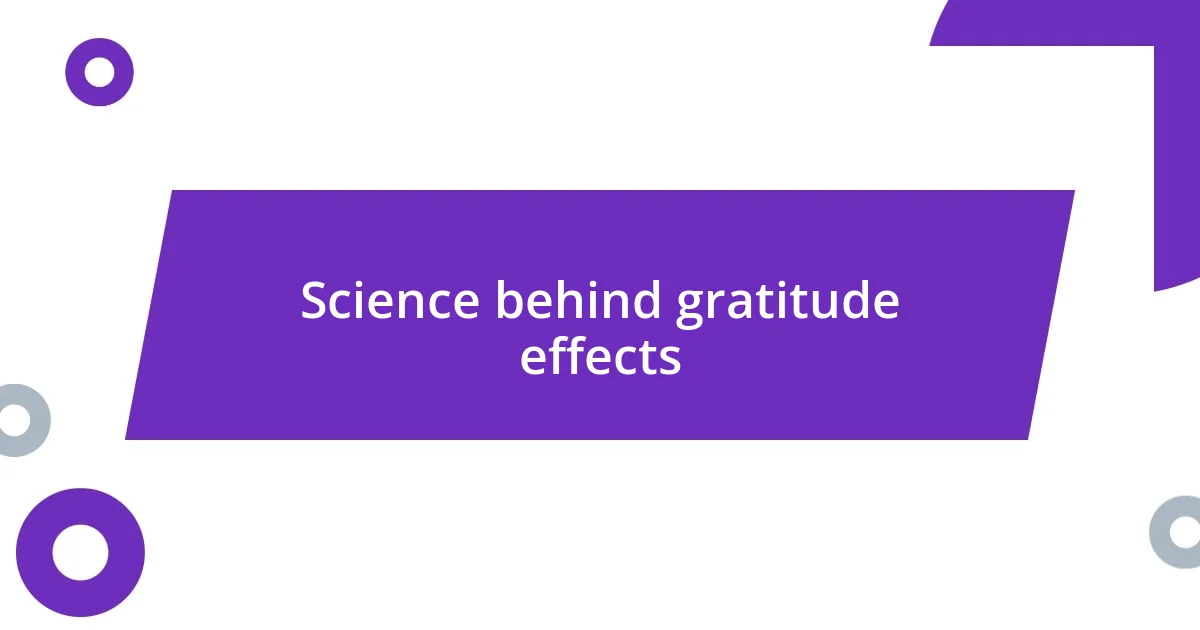
Science behind gratitude effects
Gratitude’s effects on our mental health are supported by a growing body of research. When I first came across studies detailing how gratitude practices lead to measurable increases in happiness, I was intrigued. One striking finding is that regular gratitude exercises can enhance serotonin and dopamine levels—neurotransmitters known for their roles in mood regulation. This biological response shows just how deeply gratitude can influence our emotional state.
Here are some key scientific benefits of practicing gratitude:
- Improved Sleep: Research indicates that individuals who regularly engage in gratitude exercises report better sleep quality, likely due to reduced negative thinking.
- Increased Resilience: Grateful people often exhibit greater resilience during hardship, enabling better coping strategies.
- Enhanced Self-esteem: Practicing gratitude has been linked to lower social comparisons, which can improve self-worth and overall satisfaction.
- Strengthened Relationships: Expressing gratitude can deepen connections and foster trust in relationships, enhancing social support.
- Lower Stress Levels: Regular gratitude practice can decrease feelings of stress and increase overall feelings of well-being.
I can personally attest to this; after incorporating gratitude into my daily routine, I felt more grounded during tumultuous times. For instance, amidst a particularly challenging work project, I started taking a moment each day to acknowledge the learning opportunities within that chaos. This shift not only reduced my anxiety but also transformed my perspective, making me feel more empowered and less overwhelmed. What a revelation it was to see how a simple practice can lead to profound change!
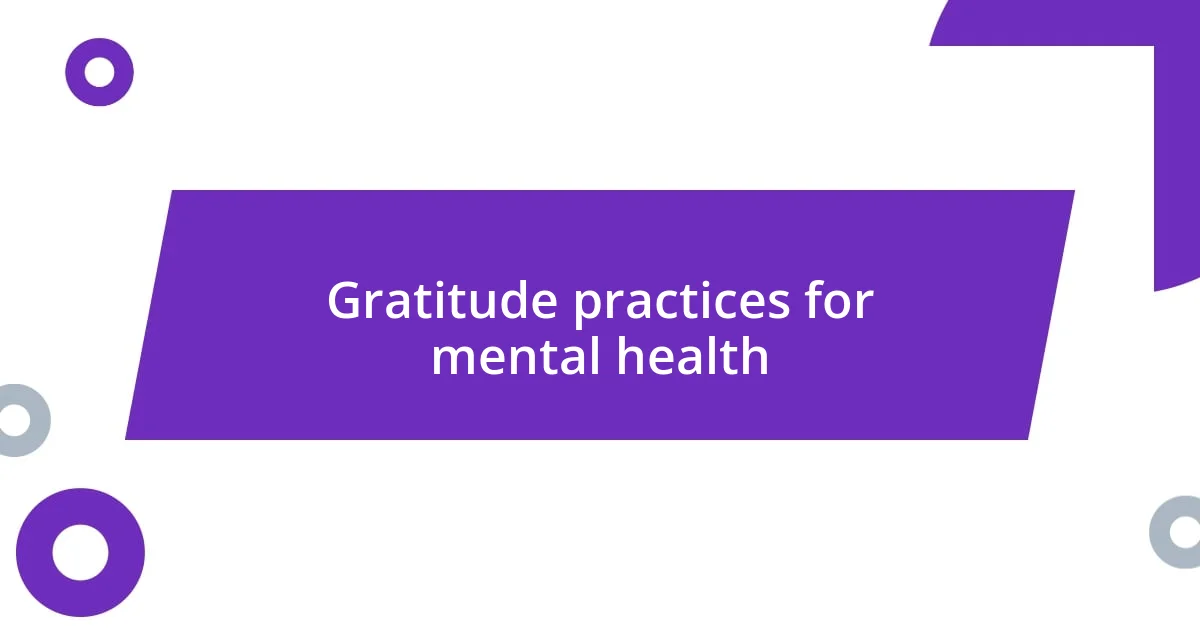
Gratitude practices for mental health
Gratitude practices can take many forms, and each has its unique benefits for mental health. One method I’ve found particularly effective is keeping a gratitude journal. Every evening, I write down five things I appreciated from the day. Sometimes it’s the smallest things—a warm cup of tea or a sunset. Over time, this practice shifted my focus from daily stressors to moments of joy, helping me cultivate a more positive outlook. Have you ever tried journaling? It’s fascinating how the act of writing can reinforce the feelings of gratitude.
Another helpful practice is sharing gratitude aloud. Whenever I meet with friends, I take a moment to express my thanks for something specific they’ve done—whether it’s simply being there to listen or a favor they’ve done for me. This not only brightens their day but also creates a sense of connection. I’ve noticed that, as I share, my feelings of happiness increase. There’s something about vocalizing gratitude that seems to amplify its effects, almost like a light that shines brighter with each word shared.
In addition to journaling and verbal expressions, I’ve also incorporated gratitude meditation into my routine. This practice involves taking a few minutes each day to focus my thoughts on what I’m grateful for, allowing me to really soak in those feelings. I remember the first time I sat down for this meditation. It felt strange to quiet my mind, but as I visualized moments of gratitude, a deep sense of peace washed over me. It’s an incredible experience that reconnects me with positivity, reminding me how much I have to appreciate, even on tough days.
| Practice | Benefits |
|---|---|
| Gratitude Journaling | Shifts focus to positive aspects of life and promotes emotional well-being. |
| Sharing Gratitude | Strengthens relationships and amplifies feelings of happiness. |
| Gratitude Meditation | Provides a deep sense of peace and reconnection with positive feelings. |

Daily gratitude journaling techniques
Journaling daily can vary in approach, and I’ve found a few techniques particularly impactful. One method that resonates with me is the “Three Good Things” approach. Each night, I jot down three positive experiences from my day, no matter how small. I used to struggle with acknowledging the good moments amid the chaos of everyday life. But now, reflecting on these small wins feels like finding hidden treasures. Have you ever noticed how those little sparks of joy can shift your mood?
Skipping the formalities, I also encourage you to experiment with themed gratitude journaling. For instance, dedicating a day each week to express gratitude for friends, family, or even personal achievements can be transformative. I recall a week when I reflected exclusively on my friendships, and it filled me with warmth. Remembering the times my friends showed up for me brought back laughter and memories that brightened my spirits. Isn’t it amazing how focusing on different aspects of our lives can broaden our perspective on gratitude?
Lastly, incorporating visuals into your gratitude journaling can be a delightful twist. I sometimes draw small sketches or include photographs alongside my notes. Recently, I added a snapshot from a hike with a dear friend, and it instantly evoked those feelings of awe and connection. Visual elements enhance the emotional depth of my reflections, reminding me not just of what I’m thankful for, but of the moments that made me feel alive. Have you tried mixing different forms of expression in your journaling? It’s an exceptionally liberating experience!
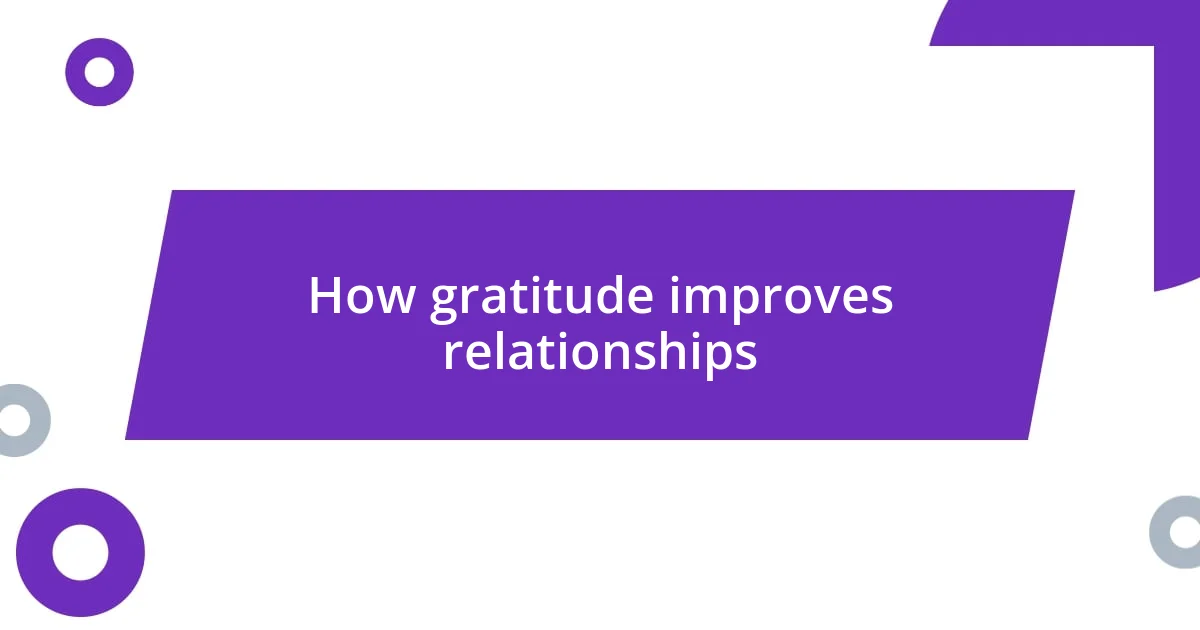
How gratitude improves relationships
Gratitude can significantly deepen our connections with others. When I express gratitude towards someone, I often see their face light up. This simple acknowledgment can transform the dynamic of our relationship, making it not just about mutual benefit but about appreciation and sharing. Isn’t it refreshing to know that a few heartfelt words can create such warmth?
Looking back, I remember a challenging period with a close friend. I decided to write them a note expressing my gratitude for their support. The relief I felt in putting those feelings on paper was immediate, but what surprised me was the response. My friend, in turn, shared how much my words meant to them, strengthening our bond even further. It’s moments like these that remind me how gratitude can be a bridge, connecting us in ways we may not anticipate.
I often find that expressing gratitude isn’t just about the recipient; it nurtures my connection to myself, too. When I make it a habit, I become more attuned to the positive aspects of my relationships. I start noticing the little things that spark joy, like a smile shared over coffee or a helping hand when I least expect it. It’s astonishing how this mindset shift not only improves my interactions but also elevates my overall mood. Have you ever experienced that rush of appreciation that transforms your day?
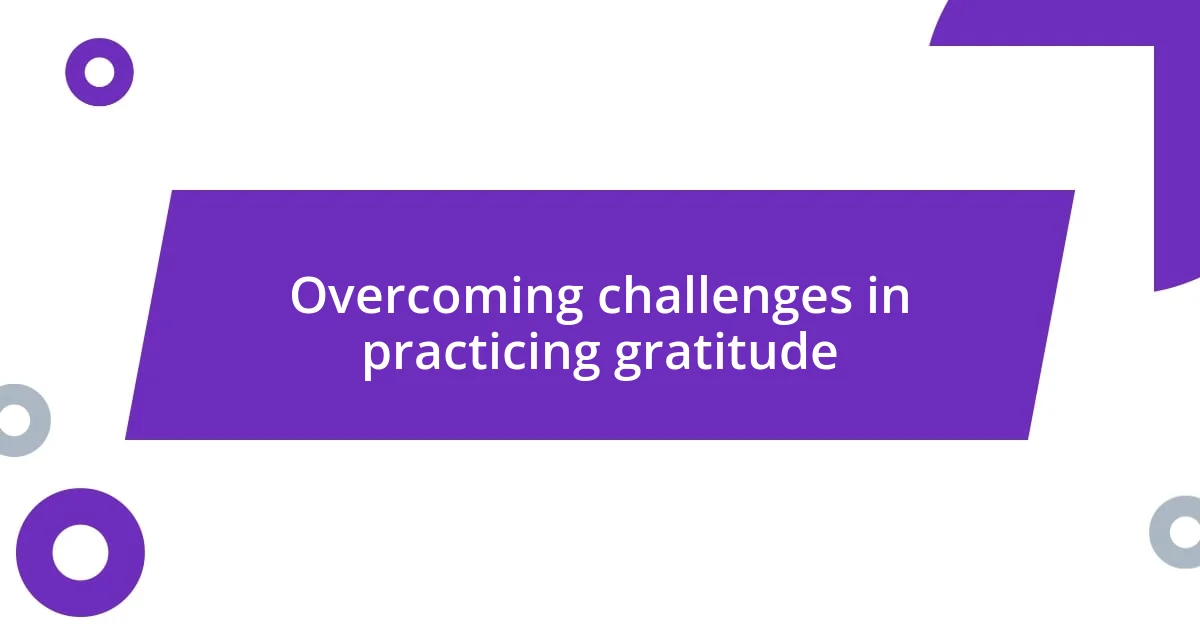
Overcoming challenges in practicing gratitude
Practicing gratitude can sometimes feel overwhelming, especially when life gets tough. I’ve found myself sitting down to reflect, only to be confronted by a wave of negative emotions. It’s during those times that I remind myself it’s okay to be vulnerable in my gratitude practice. By acknowledging the struggles that coexist with gratitude, I’ve learned to validate my feelings and find balance. Have you ever felt that conflicting tug-of-war between gratitude and discouragement?
Another challenge I’ve faced is consistency. Life gets busy, and it’s easy to let gratitude slip through the cracks. To combat this, I created reminders on my phone that prompt me to pause and reflect at designated times, like during my morning coffee. This small but effective strategy has transformed my mornings. I now start my day with a sense of purpose, even when my to-do list is daunting. Have you tried setting reminders to carve out moments for gratitude in your life?
Lastly, I often wrestle with comparing my gratitude journey to others. Social media can paint an idealized picture of what gratitude looks like, leading to feelings of inadequacy. I’ve made it a point to focus on my unique experiences instead, reminding myself that my gratitude may look different, and that’s perfectly fine. There’s value in recognizing my own small victories, no matter how subtle they may seem. It’s liberating to embrace the authentic messiness of my emotional landscape. Have you ever noticed how your gratitude unfolds? Each journey is distinct, and that individuality is what makes it meaningful.
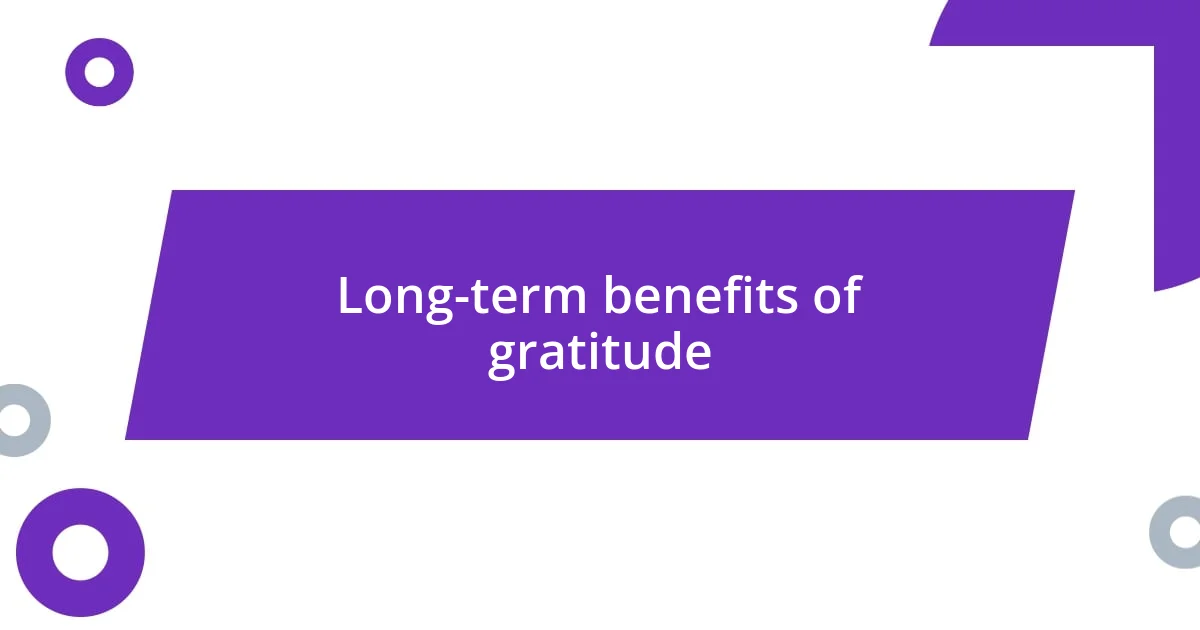
Long-term benefits of gratitude
When I reflect on the long-term benefits of gratitude, one thing stands out to me: it acts like a mental shield against negativity. I remember a time when I was going through a difficult phase at work. Instead of focusing on the pressure, I began jotting down three things I was grateful for each day—my supportive colleagues, a cozy workspace, and even my morning coffee. Over time, this simple exercise transformed my mindset, helping me cope better with stress, and I realized just how powerful gratitude can be in reshaping our mental landscape.
I’ve also observed that gratitude fosters resilience in the face of adversity. There was a period when a close family member faced health challenges, and the weight of it felt heavy. However, I started to focus on the little victories throughout that journey—like a successful treatment session or shared laughter during hospital visits. These moments of gratitude didn’t eliminate the stress, but they provided a lifeline that anchored me. I wondered if embracing gratitude in tough times could be our secret weapon against despair.
Moreover, maintaining a gratitude practice over the years has significantly enhanced my overall well-being. I’ve noticed that people often comment on my positivity, wondering how I manage to stay upbeat. I can’t help but grin because I know there’s a direct connection to my gratitude habit. It keeps me grounded and constantly reminds me to celebrate life’s small joys. Isn’t it fascinating how a shift in focus, from what’s lacking to what’s present, could lead to such a profound impact on our mental health?












